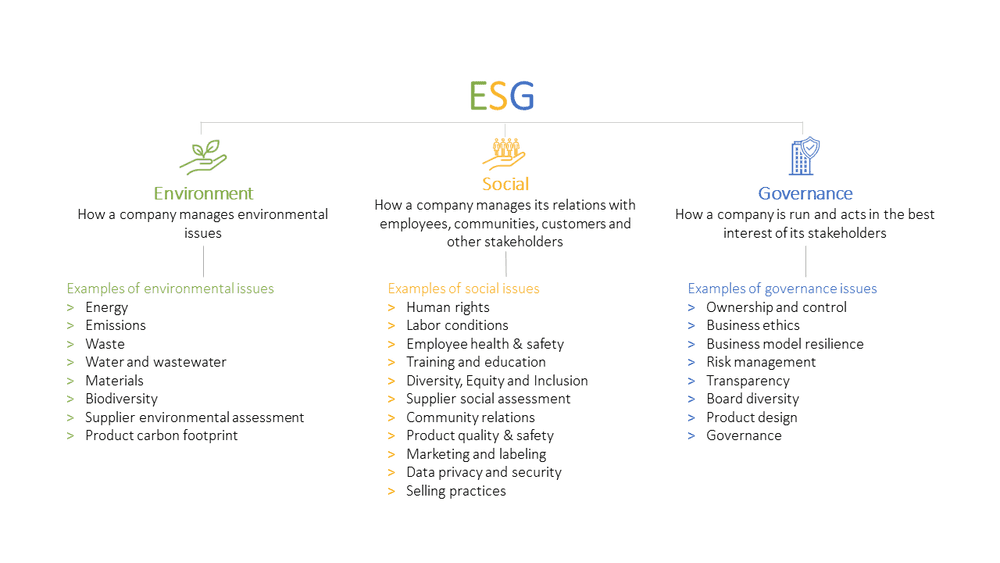
ESG Metrics: Measuring Environmental, Social, and Governance Performance for Manufacturers
One of the key practices in achieving responsible business operations is the measurement of ESG metrics within your supply chain and beyond. By effectively measuring, managing, and disclosing their ESG performance, manufacturers can enhance their reputation, reduce risks and costs, and drive long-term value. This article aims to provide an overview of ESG metrics in manufacturing, highlighting the importance of metrics monitoring for companies in their ESG journey.
What Are Supply Chain ESG Metrics?
Supply chain ESG metrics are indicators that measure a company's environmental, social, and governance (ESG) impact and fall into three main categories: Environmental, Social, and Governance.
Environmental metrics, often referred to as sustainability metrics, focus on a company's impact on the natural environment. These include carbon emissions, energy use, waste management, and more.
Social metrics evaluate a company's approach to labor practices, employee well-being, diversity and inclusion, health and safety standards, and community engagement.
Governance metrics assess the company's leadership, board diversity, anti-corruption policies, transparency, and accountability.

Measuring ESG metrics is crucial for manufacturers because it provides a comprehensive and quantitative understanding of their overall ethical performance. Here are three of the main benefits of measuring your company’s ESG metrics.
1. Measuring your company’s performance based on concrete ESG metrics allows for accurate ESG reporting, which is quickly becoming a regulatory requirement in markets around the world.
2. ESG metrics analysis enables you to identify areas where you can make positive changes and measure progress over time.
3. Measuring ESG metrics allows your company to meet the growing expectations of customers, investors, regulators, and other stakeholders who prioritize sustainability and responsible business practices. It positions your business as an industry leader and enhances your competitiveness in a rapidly evolving market where sustainable practices are becoming the norm.
Key ESG Metrics for Manufacturers
When it comes to measuring and reporting on ESG performance, manufacturers must have quantitative data derived from their supply chain. This data-driven approach allows for transparency, accountability, and effective monitoring of sustainability efforts.
Here are some key ESG metrics that manufacturers should consider measuring and reporting on:
Environmental Metrics: Sustainability Metrics for Manufacturing Companies
Energy consumption and carbon emissions: This is one of the most important ESG metrics for manufacturers, as it measures the company's impact on climate change. Companies can track their energy consumption and carbon emissions by using a variety of methods, such as energy audits and greenhouse gas (GHG) accounting. There are also tools to help you make these calculations. For example, ReFlow, a lifecycle-based platform, helps companies calculate, document, and share environmental performance data of their products.
Water usage and wastewater management: Water is a precious resource, and manufacturers need to be mindful of their water usage. Companies can track their water usage and wastewater management by installing water meters and monitoring their wastewater treatment systems.
Waste management and recycling initiatives: Manufacturers generate a lot of waste, so it's important to have effective waste management and recycling initiatives in place. Companies can track their waste management and recycling efforts by measuring the volume and types of waste generated, such as hazardous waste, non-hazardous waste, and recycling rates.
Social Metrics: Social Responsibility Metrics for Manufacturing Companies
Labor practices and employee well-being: This metric measures the company's commitment to providing safe and fair working conditions. Companies can track their labor practices and employee well-being by surveying their employees, conducting workplace audits, and monitoring employee turnover rates in addition to health and safety records.
Supply chain labor standards: This metric measures the company's commitment to providing a safe and healthy work environment for its employees. This metric involves assessing and reporting on labor practices and human rights standards within the supply chain, including supplier assessments, audits, and compliance with internationally recognized standards.
Community engagement and philanthropy: This metric measures the company's commitment to giving back to the communities in which it operates. Companies can track their community engagement and philanthropy by measuring and disclosing community investment initiatives, including corporate philanthropy, volunteering programs, and partnerships with local organizations.
Governance Metrics: Corporate Responsibility Metrics for Manufacturing Companies
Board diversity and composition: This metric measures the diversity of the company's board of directors and its commitment to good governance. Companies can track their board diversity and composition by measuring the number of women and minorities on their board, the number of independent directors, and the board's overall diversity of thought.
Anti-corruption and bribery policies: This metric involves monitoring and reporting on the effectiveness of ethics and compliance programs, including the presence of a code of conduct, whistle-blower mechanisms, and anti-corruption measures.
Transparency and accountability in decision-making processes: This metric measures the company's commitment to transparency and accountability in its decision-making processes. Companies can track their transparency and accountability by publishing their decision-making processes, making information about their operations available to the public, and responding to inquiries from stakeholders.
Executive compensation: Another ESG metric manufacturing companies may choose to disclose is executive compensation practices, including the alignment of incentives with ESG performance and long-term sustainability goals.
Conclusion: Measuring Progress with ESG Metrics
As sustainability and social responsibility become paramount concerns for manufacturing companies, measuring and managing ESG metrics is vital. By measuring, understanding, and implementing ESG practices, manufacturers can enhance their reputation, reduce risks, and contribute to a more sustainable future.
Manufacturers seeking to improve their ESG metric tracking and performance can turn to industry experts like QIMA. With expertise in quality control and compliance solutions, we offer ESG assessment and auditing services. By partnering with QIMA, manufacturers gain access to valuable insights and guidance to enhance their ESG performance, ensuring a positive impact on the environment, society, and governance practices.
Embrace the power of ESG metrics in manufacturing and position your company as a responsible leader, driving positive change and long-term success.
Discover effective methods for mitigating ESG risks within your supply chain by exploring our report: A Step-By-Step Guide on Implementing Your ESG Risk Strategy
Related Articles


